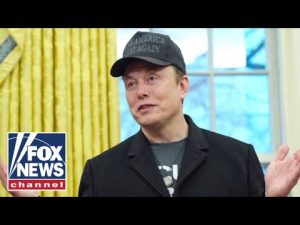**Musk’s Disappointment and the Spending Showdown: A Tale of Unfulfilled Promises**
In a twist that has sent shockwaves through the corridors of Washington, tech titan Elon Musk has expressed his dismay over the recent massive spending bill, long hailed as a “big beautiful bill.” Instead of curbing the budget deficit, Musk believes it has only added fuel to the fire while undermining various initiatives he supports, particularly those related to the popular cryptocurrency, Dogecoin. As the dust settles, it appears this financial conundrum is unfolding in a three-act drama that has the potential to shape the future of federal spending.
Musk’s critique wasn’t just a fleeting thought; he offered a perspective that many in the political realm reluctantly acknowledge. His idea that a bill can either be “big” or “beautiful” seems to resonate with common sense. In the world of politics, beautifully-crafted legislation often gets bogged down with compromises and complexities—much like a cake that looks great but has too many conflicting flavors. When the federal spending machine churns out such bloated bills, something essential gets lost in the mix: fiscal responsibility.
In a counter-move, White House Deputy Chief of Staff Steven Miller attempted to clarify misconceptions regarding the spending bill and its implications. While the administration shifts focus to reconciliation, the real battle seems to be brewing over discretionary versus non-discretionary spending. This becomes a talking point for Republican politicians eager to propose cuts, but there’s considerable skepticism surrounding their authenticity. With every election cycle, promises of reducing government waste become a familiar tune, yet few see real change.
As the media circus continues, insiders suggest that the pressure is mounting on the House GOP to consider the proposed Doge cuts from the White House. With the prospect of reelection looming, some GOP senators might find themselves cornered by online movements ignited by none other than Mr. Musk himself. There’s a surge of grassroots interest, reminiscent of the Tea Party days, pushing for accountability and fiscal conservation. However, as history has shown, executing meaningful change often feels like herding cats.
With this pressure building up, observers wonder whether the Republican Party will take a stand against the persistent spending habits. Musk’s involvement could be the spark needed to ignite a movement that holds politicians accountable for their promises—or lack thereof. Some GOP leaders, facing potentially tough primaries, might just listen if they perceive their political survival is at stake. Yet, as the clock ticks, it’s becoming evident that skepticism lingers around whether any significant cuts will manifest, as empty promises have been the staple diet of Capitol Hill for far too long.
In this ever-dramatic saga of federal spending, Musk’s dissatisfaction may serve as a rallying cry for those frustrated with political inertia. Will the clock finally strike twelve on the age of extravagant government spending? Only time will tell. There’s hope that with vigilant citizens and influencers like Musk in the fray, pressure might finally lead to results, ensuring that Washington gets the memo: bigger isn’t always better, and accountability shouldn’t be an afterthought. As this spending show continues, all eyes will be watching to see if the big bills can transform into something beautiful for the American people.







